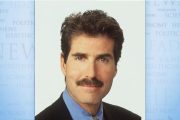If you’ve never heard Rep. Paul speak before, you might be surprised at his delivery. He is no fiery orator. He delivers his remarks in a calm, almost professorial manner. But if his manner is mild, his content most assuredly is not. What he has to say is far more radical, even revolutionary, than anything the average American is used to hearing today.
Ron Paul would actually enforce the U.S. Constitution!
Since he (rightly) regards the overwhelming majority of things Big Government does today as unconstitutional, that means he has never met a spending bill he likes. Or intervention in a foreign land without a congressional declaration of war. There is a good reason that, among both friends and foes in Washington, Ron Paul is known as “Dr. No.” (In his private life, Dr. Paul is an obstetrician who has delivered thousands of babies.)
After years of toiling in obscurity, in the past couple of years Ron Paul’s message of limited government and unlimited freedom really caught fire. When he decided to run for President in the Republican primaries last year, even he was startled by the size and enthusiasm of the crowds he attracted.
“Yes, I admit I was pleasantly surprised by the response to my message,” he told me. “I think something has been rumbling in the country for a long time, and I happened along just when people were waiting to hear this message.”
And then he made an extremely important point: “I think we’re a lot further along in the freedom movement than some of us have realized. We’re seeing a major shift in the attitude of many people. I think this is happening for two reasons: First, a lot of people have been exposed to free-market economics and the principles of freedom. Second, they are being confronted with dramatic evidence that the current system isn’t working. So whether you’re on the receiving end of government giveaways, or you’re one of the ones whose wealth is being taken, both sides are starting to realize, Hey, there’s something wrong!”
Ron’s message has found especially fertile ground among young people. When I introduced him at a conference in Las Vegas a year ago, I was astounded by the numbers, the energy, and the enthusiasm of most of his supporters, many of whom were high school students. The average age of the crowd was probably around 25, which certainly gave new inspiration to all of us oldsters who were there.
And by the way, I want to offer a few words of praise and encouragement to my fellow seniors who’ve been preaching the message of freedom for many, many years. I know we’ve all-too- often despaired that our message was falling on deaf ears. Not true, my friends! Young people have been listening, they’ve been reading, and they’ve been asking some tough questions. And believe me, they are no longer satisfied with the reassuring platitudes they get from today’s politicians.
As Ron put it when we spoke, “Young people in particular grasp our message. They feel as though they’re going to be – if they’re not already – victimized. Whether it’s foreign policy or an attack on their personal liberties and personal choices, they’re very concerned. They’re worried about jobs and how they’re going to pay their bills. About Social Security indebtedness and all of those things.
“The most exciting part for me has been seeing their interest in monetary policy. They’re actually asking shouting out their support for abolishing the Federal Reserve! That’s been amazing to me.”
Ron told me the story of how his “End the Fed” campaign began. “This followed a debate in Detroit during the primaries. We were talking about the economy and I was claiming we were already in the middle of a recession. Well, my Republican opponents didn’t want to hear that.
“Afterwards, I went to a rally at the University of Michigan. This was early in the campaign and I didn’t expect very much, to be frank. But there were 4,000 or 5,000 young people there. During my speech, they started to chant: ‘End the Fed! End the Fed!’ Some of them even began pulling Federal Reserve notes [you know them as dollar bills] from their pockets and lighting them on fire.
“I could never forget the image of that happening. So of course it became part of my campaign. When it came to picking a title for my book, that was an easy choice to make.”
(Quick commercial plug: Ron’s book, End the Fed, climbed to the top of the New York Times’ best-seller list and stayed there for many weeks. It’s dropped a bit recently, which is good news for you if you don’t already own a copy. Because it means you can find them at Barnes & Noble or Amazon.com for a substantial discount off the $21.99 cover price. Get ‘em while you can. And think about what a great present one would make for all of the students on your list.)
To be honest, I don’t think it’s necessary to read every word of every chapter of Ron’s book. Unless you’re simply amused by mumble-jumble and government jargon, you can pretty much skip chapters six and seven (“Conversations with Greenspan” and “Conversations with Bernanke”).
But please pay careful attention to chapter ten, “Why End the Fed?” Here’s how it begins:
“The Federal Reserve should be abolished because it is immoral, unconstitutional, impractical, promotes bad economics and undermines liberty. Its destructive nature makes it a tool of tyrannical government.”
So of course I had to ask him, “Other than that, Ron, what’s wrong with it?”
“Bad government destroys liberty” was his succinct reply. “And the Federal Reserve leads to bad government and bad monetary policy. Not only did they cause the present economic crisis, they’re perpetuating the problem.”
Rep. Paul has introduced legislation to audit the Federal Reserve every year for the past dozen or so years. And every year it gets bottled up in committee and never sees the light of day.
But this year is different.
When we spoke, Ron already had 301 co-sponsors for the legislation. That is every Republican member of the House of Representatives and a bunch of Democrats, too. So it’s a shoe-in to pass, right?
Wrong. Although Ron has gained some surprising support for the measure, including Massachusetts’ very liberal (but very powerful) congressman, Barney Frank, the powers-that-be are dead-set against the measure. He expects House Speaker Nancy Pelosi to do everything possible to prevent a floor vote.
But at least the measure has been voted out of committee. In an email to me after that action, Ron wrote, “I was pleased last week when we won a vote in the Financial Services Committee to include language from the Audit the Fed bill HR1207 in the upcoming financial regulatory reform bill. As it stands now, if HR 3996 passes, because of this action, the Federal Reserve’s entire balance sheet will be opened up to a GAO audit. We will at last have a chance to find out what happened to the trillions of dollars the Fed has been giving out.”
Does either of us expect an easy victory in Congress this year? Of course not! And even if his measure did pass, despite everything Nancy Pelosi and her cohorts did to stop it, the chances that it will be approved in the Senate and signed by the President are just about zero.
And even when the bill does get signed into law, expect the manipulators of our money system to do everything in their power to protect their trillion-dollar benefactor.
No, folks, this will not be a quick or an easy fight. Ron Paul expects the battle for honest money and limited government to last the rest of his life and beyond. So, frankly, do I.
But rejoice that the battle has been joined! The enemy has been identified! And the weapons we need to win – truth in the hands of an informed public – are all we need, and all we have.
Let me end this article as Ron Paul concludes his book. Here are the last three paragraphs of End the Fed:
“We have a natural, God-given right to our lives, our liberties, and the fruits of our labor.
“Protecting those rights is the only role that government ought to have in a free society. To restrain the government from doing more requires a morally determined people willing to assume self-responsibility, rejecting dependence on government force to mold the economy, society, or individual behavior.
“If the freedom movement continues to grow as it has these past two years, I would say there’s plenty of room for optimism. Freedom and central banking are incompatible. It is freedom we seek, and when that precious goal is achieved, the chant ‘End the Fed’ will become a reality.”
Amen to that. When that happens, all of us at The New American will be thrilled to say we told you so. And yes, we did our part.
–Chip Wood
W.W. “Chip” was a contributor to American Opinion and one of the founding editors of The Review of the News, two publications that merged to form The New American. He was also the National Director of Ad Hoc Committees for the John Birch Society for many years. In that capacity, he often spoke to patriotic groups across the United States.



